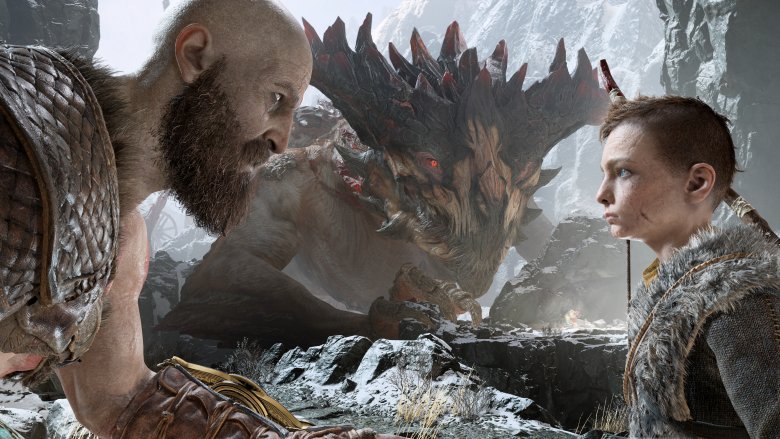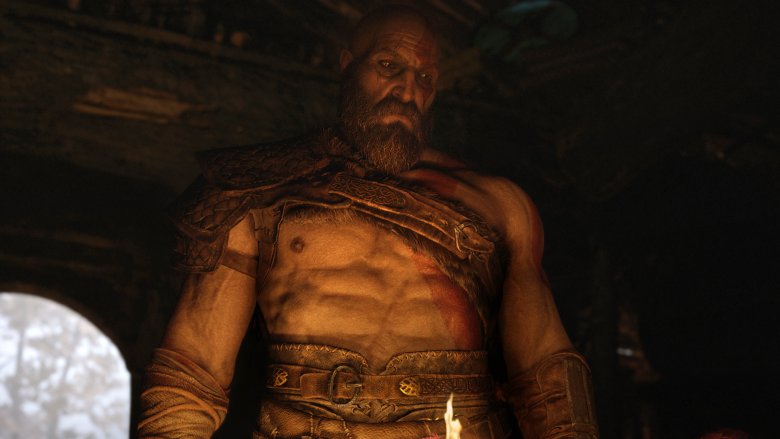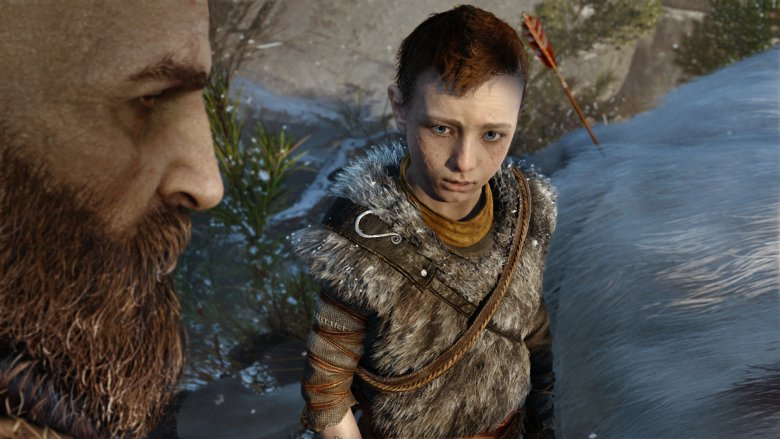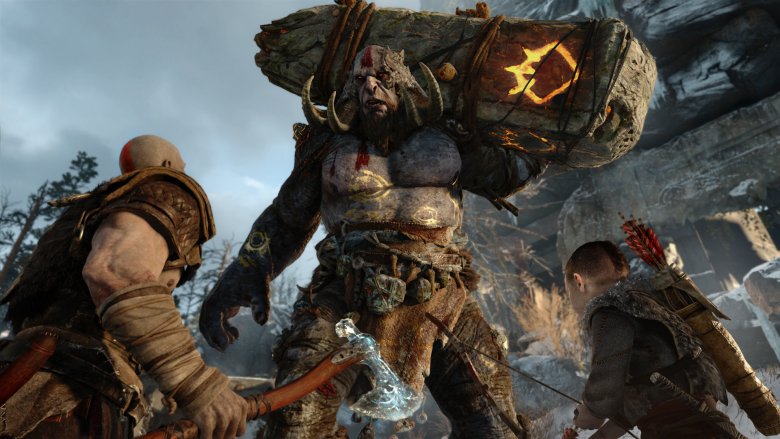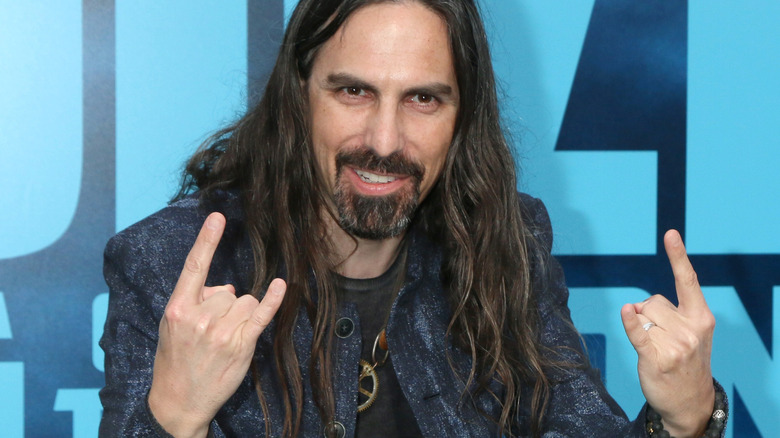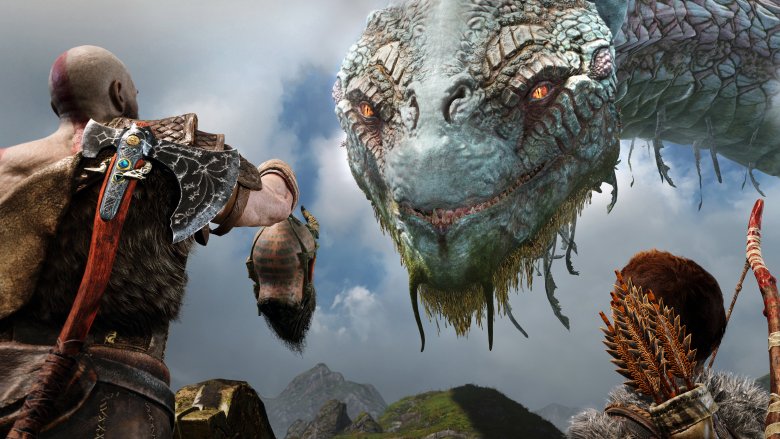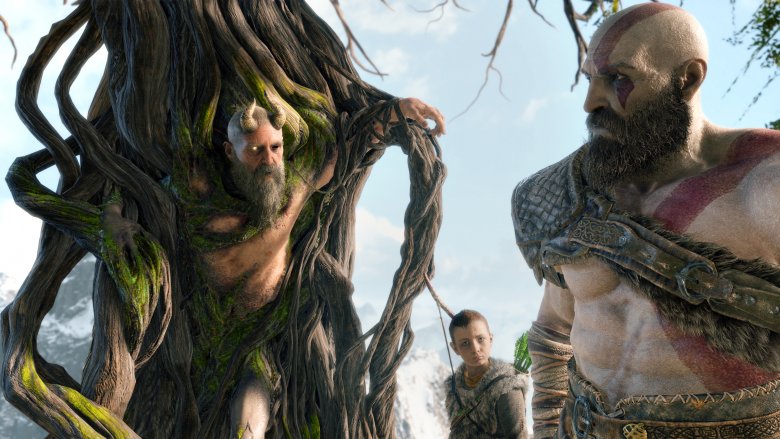God Of War: Everything You Need To Know About The New PS4 Title
Sony's Santa Monica Studio reinvented the hack-and-slash genre with the original God of War for the PlayStation 2 in 2005, a blisteringly hyperkinetic action experience set in a heavily-modified version of Greek mythology. Players took control of Kratos, a raging Spartan warlord bent on getting revenge on Ares, the God of War. Wielding his signature Blades of Chaos, which could be flung on chains seared into his forearms, Kratos ripped his way through soldiers, creatures, and giant monsters in his path — often literally. More epic and over-the-top than anything available at the time, the game soared above its competition and became a defining title of the best-selling PS2 console.
Naturally, a franchise followed, stretching across the PlayStation Portable and PlayStation 3 for a total of six main releases. All of them were excellent action games with slick controls and stellar graphics. But by 2013's God of War: Ascension, excitement over the series had stalled. Sony has given Kratos five long years to rest and recuperate. But in 2018, a new game — also titled, simply, God of War — is set to debut. But a lot has changed in the intervening years, and Kratos will return a changed character in a changed setting. Here's what you need to know before buying it, whether you're a God of War vet or brand-new to the franchise.
Kratos has moved on from Greece, in both time and place
To date, all of the God of War games have been set in mythological Greece — or rather, a land vaguely inspired by mythological Greece. That has brought with it a beautiful Hellenistic aesthetic, from the colonnaded architecture to the hairstyles to the clothes. Plus, Kratos has encountered, and killed, pretty much every major Greek god. It's a part and parcel of the franchise.
But not anymore. For this new adventure, Sony Santa Monica has finally left Greece behind. They've brought the series to Scandinavia — or, again, a version of Scandinavia loosely based on Norse myths. The columns have been replaced by Viking designs. The new setting also allows for a very different geography, including snowy mountain peaks.
The move, however, entails more than just place: the Norse era came long after the Greek era in real-world history, so it's plausible that this new game happens hundreds of years after the previous games. Kratos, as a demigod, could conceivably have lived this long. More importantly, Kratos has had a long time to ruminate over his past actions, and either regret or accept his monstrous nature. Whether you've played the old games or not, this is a new character you'll be encountering.
And a new game, too: after all those years making Greek games, Sony Santa Monica will finally get to try out new ideas, places, and stories in this Norse world. Whether that translates into a substantively different experience remains to be seen — and played.
A veteran director is at the helm
Cory Barlog worked on many God of War titles, most notably as the director of the excellent God of War II. Widely considered the swan song of the PS2, the game pulled together everything that made the console great: smooth animations, gorgeous visuals, orchestral sound, and tight controls. Barlog proved that he could take everything that made the first game work, up the ante, and still produce an experience that was lean and focused. It was a sad day when he announced that he was leaving the studio, and the industry, behind in 2008. He even specifically said, "I don't want to make God of War IV and God of War V."
Times change, and by 2013, Barlog had returned to Sony Santa Monica. The new God of War was announced in 2016, and it turned out that this was the very project that Barlog had come back to direct. The God of War franchise is notorious for never retaining its directors: no two games have ever been led by the same person. Barlog has now broken the trend.
Fans of the older titles can rest assured that the series is in the hands of someone who knows it and loves it, and what's more, can make excellent games out of it. Even those of you new to the series should be excited that this is a game being crafted with a creative's vision behind it, and not simply a corporate mandate.
Kratos will be more complex this time around
Kratos likes to rage. A lot. As originally conceived, the Spartan was a pure manifestation of anger, a never-ending fountain of pure bloodlust. This single-mindedness made for some interesting narrative explorations: what happens when a person so dead-set on revenge destroys the world in the process, as he does in God of War III? In Chains of Olympus, he even finds happiness again by reuniting with his daughter in Hades ... only to realize that his happiness has made him weak, and he must reject his own child to reclaim his rage and his strength. The character was defined by a singular emotion.
But this time around, the team at Sony Santa Monica want to bring a more diverse emotional palette to the Spartan. Now that he's raising a son, Kratos will have gained a new perspective on both life and himself. Scenes revealed in trailers show Kratos expressing empathy and patience with his boy, even if he's still teaching him about life and death. This is still a hardened warrior, but one tempered by time and fatherhood.
Don't worry: this is a combat game and Kratos will be fighting plenty. In fact, if anything, Kratos' new-found depth raises the possibility of more questions: can anyone that angry really ever change? There are a lot of directions Sony could take this, and that in itself has injected the series with fresh blood.
Kratos has a new family – and at least one of them is alive!
In the very first game, the narrative builds to a major reveal: that Kratos, in a fit of Ares-induced bloodlust, slaughters his own family. The tragedy of this moment haunts the character, propelling him to attempt suicide, seek revenge against a god, and even abandon the real world to stay with his daughter in the underworld. In fact, even Kratos' signature look comes from this pivotal event: his skin is forever coated in the ashes of his own family members. Every single moment you see Kratos, you're seeing a little piece of his shame.
So it was a bit of a surprise when, right in the announcement trailer, we discovered that Kratos would again have a family this time around. And at least one of them is actually still breathing! The legendary Spartan warrior, now living in a Norse setting, will be accompanied by his son Atreus throughout the new journey. Kratos will be teaching his kid new skills, alongside hard truths about life and death. Atreus himself will assist the player during exploration and combat as an integral part of the experience.
The identity of Atreus' mother, meanwhile, has intentionally been kept under wraps. Whether she's alive or dead, we still don't know. How Kratos met her, and whether he stayed with her or is only just now reconnecting with his adolescent son, are questions that the story should answer by the end. Just like the first game, family will be central to the themes and motivations of God of War. But this time, they may have a say in the matter themselves.
The franchise is getting more mature, matching its audience
The older God of War games expressed a testosterone-fueled fantasy, in which the main character killed with abandon and occasionally had sex with ladies in hot tubs. Despite the darker themes involved, the stories were often straightforward and simple. They were, at the end of the day, games intended for teens and twenty-somethings, particularly men.
But it's been over ten years since the release of the original game. The industry has evolved, with complex narratives like Sony's own The Last of Us proving that gamers are ready, and even eager, for more sophisticated affairs. Meanwhile, those fans who played and loved the first games are likely to come back for the new title, but they themselves have grown a decade wiser (we hope). Exultant murder sprees and one-off sexual escapades just don't resonate in the modern marketplace in the same way, and likely wouldn't with older gamers, either.
Putting all that together, Sony made the wise decision to change the tone of the new game. It'll be a more mature experience to match its own audience and the industry as a whole. How dramatic a shift this will be in practice remains to be seen. At the end of the day, Kratos will still be chopping enemies in half. But there will be no hot tubs this time around.
The famous chain-blades are nowhere to be found (yet)
Right from the box art of the first God of War, Kratos has been synonymous with his weapons: the Blades of Chaos, supernatural swords that Kratos can fling from chains seared into his forearms. For as brutal as Kratos is, these weapons allowed him to be graceful and balletic in his attacks. They gave him the ability to attack at both short- and long-range. Plus, they were just plain cool to watch in action. While Kratos would earn new weapons throughout each game, nothing ever felt as good or as natural as the blades. By the last game, Ascension, Kratos simply gained new elements for his blades rather than new weapons. Why would anybody not use them?
Well, for the new game, you won't have a choice. As Cory Barlog explained in an interview, the Blades of Chaos were inextricably linked with Kratos' relationship with the gods of Olympus. Ditching the blades was a signal to the audience that Kratos has left that past behind. In their stead, the ashen warrior will wield an axe. But lest you think that long-range attacks are gone, know that this is no ordinary weapon: Kratos can throw it against any enemy or part of the environment, and then recall it to his hand. As it returns, anything between him and the axe will be sliced. This opens up a lot of interesting geometric attack possibilities. And again, it's just plain cool to watch in action.
Barlog has also teased that the weapon has a connection to Kratos' new family, so just like his old blades, this new axe has narrative heft to it as well.
The music is from a fantastic composer
God of War games have always had epic music painted on the largest canvass possible: huge, sweeping tracks of pure scope and scale. For all that, the series has never had a single defining composer. A large roster of different composers has leant their talents across all the games in the series thus far.
Perhaps as part of the series' clean break with the past, or maybe to boost the profile of the game's music, a different composer was brought in for the upcoming God of War title. Not an unknown name this time, but one of the best and most famous composers working in the Golden Age of Television: Bear McCreary, who shot to fame with Battlestar Galactica and has since provided scores for The Walking Dead and Outlander among many others.
What better way to announce this partnership than, without context, giving McCreary an entire orchestra at E3 2016 to conduct his new theme for the game as a lead-in to God of War's reveal trailer? There isn't a better way. Which is why Sony did it. The theme itself retains the epic scope of games past, while injecting a Norse flair and the moody atmosphere of a long-suffering, immortal warrior. If that track is any indication, God of War will, once again, feature the kind of music you'll want to listen to long after the game is finished.
Quick-time events are gone
A signature feature of the old (PRESS O) God of War titles were the (PRESS TRIANGLE) quick-time events (PRESS X) –
Oops, you didn't press X in time. You'll have to start this section again.
A signature feature of the old God of War titles were the quick-time events, in which players would be treated to a particularly cinematic attack sequence, but were forced to press certain buttons at specific times to complete it. These moments were visually stunning, but in terms of gameplay mechanics, were either boring or frustrating, depending on your point of view. Either way, they didn't go over very well. Though the games themselves are loved to this day, quick-time events have become something of a dirty term in the industry.
However, the new game won't feature quick-time events at all. In their place, the team at Sony Santa Monica have experimented with a few different replacements. These are designed to be more interactive than "push a button when the screen says," and hopefully will be more of a gameplay mechanic than what they replace.
All around, it's a smart move: quick-time events have fallen out of favor in other games, and few titles use them anymore. The new God of War is meant to be a fresh start for the series, and sticking an old mechanic into it, just because it was traditional for the series, wouldn't have supported that new effort.
It will be open, not open-world
For a while now, open-world games have been all the rage in the industry. In particular, the success of The Elder Scrolls V: Skyrim seems to have lurched any game with a fantasy setting towards open environments and free-form roaming, including the Witcher and Dragon Age franchises. While incredibly expensive to build and notoriously buggy at launch, this genre allows for some of the deepest world-building experiences around. God of War games had always been linear, but given how much else was changing, might it make the same shift as other franchises?
In a word: no. Sony Santa Monica still has a specific narrative path that they want Kratos to go on, and that doesn't leave a lot of room for hundreds of hours of exploration. That said, there will be side activities to pursue, including optional boss battles. If previous games are any indication, these linear sections will be polished to perfection, allowing for some of the largest-scale combat encounters ever seen in a game.
While we haven't seen any specific fight of this size in the trailers, we do see Kratos encounter the colossal World Serpent at one point. If that ends in a battle, it's going to be grandiose in the extreme. If the designers had to split their time designing thousands of acres of other content, fights of that complexity might not be possible to shoehorn in.
There will be no multiplayer this time around
In the late 2000s, when World of Warcraft and Call of Duty ruled the revenue streams, it seemed like every developer was trying to find a way to put their games online. Even single-player experiences like Assassin's Creed and Mass Effect were stuffing multiplayer components into their latest releases. God of War proved to be no different when Ascension came out with a competitive arena format of its own. These were fun matches that wove together the single-player's tenets of fast-paced combat, timed attacks, and big monsters to slay. But the multiplayer mode never took off, and certainly never gave Call of Duty any sleepless nights.
The new God of War looks to be huge in every respect, while also being incredibly detailed, right down to the individual hairs in Kratos' beard. To make sure every element, big and small, will be as high-quality as possible, it looks like Sony Santa Monica has cut multiplayer out of the game altogether. These were always campaign-focused adventures anyway, so doubling down on what made the franchise stand out in the first place ought to be the right decision. It's not like there were legions of God of War multiplayer fans howling for a new entry. That said, there's probably somebody out there who really loved that hack-and-slash competitive mode. Well, that person can keep playing Ascension. Probably by himself.
Kratos will sound different – but familiar to a different fan base
Terrence C. Carson has always been the voice of Kratos, and if his performance is any indication, the script he was given was in ALL CAPS, ALL THE TIME!!! But that was the point of the original, Greek Kratos: enraged, over-the-top, and living to the outermost limits of violence. Carson was a perfect fit for the Spartan bent on revenge. But as we've mentioned already, though this is the same Kratos, he's in a new phase of his life. With a new maturity and depth of emotionality for Kratos, Sony decided that they needed a new voice to truly capture him.
So now Kratos will be voiced and motion captured by Christopher Judge. Judge spent an incredible ten years on the science-fiction series Stargate: SG-1 as the alien Teal'c, so any fan of that show will know him well. God of War will mark his highest-profile role since the show ended in 2007. Based on the trailers released so far, Judge will bring a layered complexity to the warrior that balances both his blood-drenched guilt and his budding, if fragile, humanity. It seems likely that Kratos as a character will be challenged in profound ways throughout the adventure, and it'll be exciting to see what Judge can bring to these intense moments.

